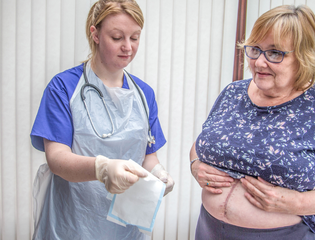New NICE recommendations for PARP inhibitor rucaparib (Rubraca)

The PARP inhibitor will be available earlier for women with ovarian cancer.
NICE (the National Institute for Health and Care Excellence) has issued its final guidance recommending the PARP inhibitor rucaparib (Rubraca) in England for maintenance treatment of advanced (stage 3 and 4), high-grade epithelial ovarian, fallopian tube or primary peritoneal cancer after complete or partial response to first-line platinum-based chemotherapy.
This maintenance treatment will be available to women whose cancer is:
- BRCA mutation-negative and homologous recombination deficiency (HRD) positive,
or - BRCA mutation-negative, and HRD status is negative or unknown, and bevacizumab is not a treatment option because:
-the eligibility criteria for it are not met, or
-it is contraindicated or not tolerated
Evidence shows that rucaparib increases the amount of time patients have before their cancer may return (known as “progression-free survival”).
Previously, rucaparib was available for relapsed disease, for women with and without a BRCA mutation. This means after having first line chemotherapy and a good response, if the disease returned, these patients would then be eligible for rucaparib after their second course of chemotherapy.
The new decision from NICE gives access to this drug at an earlier stage for eligible women. This means they can begin taking this maintenance drug straight after their first-line chemotherapy, rather than waiting to see if the disease comes back. It also offers an additional option for others who were already eligible for other first line maintenance treatments, giving them and their doctors more choice. In addition, it offers a vital treatment opportunity for women who are BRCA negative, who are HRD negative (or unknown) and can’t take bevacizumab. The company specified that these are the groups of patients they wanted the drug to be considered for.
Anyone taking rucaparib before these new guidelines will be unaffected and their treatment will continue. Women who have been found to carry a faulty BRCA gene have access to other maintenance treatments, which you can read more about on our treatment hub.
At Ovarian Cancer Action, we welcome all progress that gives women more options and welcome the decision to give access at an earlier stage. Many women have told us that the anxiety around fear of recurrence affects them a great deal, and that being able to take a maintenance drug helps them to feel like they are actively continuing to treat their disease with medication they take at home.
Michelle, who was diagnosed with ovarian cancer in 2018 and was able to access rucaparib after a recurrence in 2022, shares her thoughts on this decision:
"I think any extra protection to reduce the risk of recurrence can only be a positive. The first thing you want to know after first line cancer treatment is “when is it coming back?“
I became almost obsessed with this and still am to an extent. I kept asking doctors, but they don’t know and cannot predict.I did ask for rucaparib initially at diagnosis but was told no, I had to wait for a recurrence as I didn’t fit the criteria. Would that have prevented my recurrence? I guess I will never know but I’m certain I would have felt more positive about the future rather than sitting and waiting for cancer’s head to pop up again. For me, to be able to commence a PARP was an extra safety blanket in the protection of a further recurrence.
Ovarian Cancer Action was one of several charities that contributed evidence to help NICE make this decision, providing the committee with feedback from women as to how PARP inhibitors (and rucaparib in particular) improved their quality of life, as well as their physical and mental health.
Marie-Claire Platt, Head of Policy and Research at Ovarian Cancer Action, says:
"Treatment options for ovarian cancer are shockingly limited. We welcome rucaparib being made available to some newly diagnosed women. Early access to a PARP inhibitor is a significant priority for patients. However, it underscores the need for more research to develop new effective treatment options for women who will not benefit from this new option.”
What are PARP inhibitors?
PARP inhibitors are a type of maintenance treatment. They can prevent the spread of cancer by stopping a protein called PARP from performing its usual job of helping damaged cells repair themselves. PARP inhibiters can stop (‘inhibit’) this repair process from happening in damaged ovarian cancer cells, which causes the cancer cells to weaken and die.
These drugs don’t cure ovarian cancer but they do prevent its progression. By delaying the spread of the disease, women can feel better and live healthier lives for longer, experiencing reduced symptoms. The increase in time between chemotherapy treatments also means fewer trips to hospital to receive treatment.
What is HRD testing?
HRD stands for homologous repair deficiency. This is what we call it when there is an error in one of the genes involved in repairing DNA. You may have heard of faulty BRCA1 or BRCA2 genes. They are just two of the genes involved in this DNA repair function, but there are many more.
Alterations in these genes can result in a higher risk of high-grade serous ovarian cancer, but also a better response to maintenance treatments, also known as PARP inhibitors.
HRD testing is performed on a sample of a tumour after surgery, at the same time and in a similar way to how tumour BRCA testing works.
If you have just been diagnosed with high-grade serous ovarian cancer, you should ask your oncologist about HRD testing as part of your treatment pathway. If you have a confirmed faulty BRCA gene (either through blood or tumour testing), you are classed as HRD positive.
NICE recommendations apply to England, but the recommendations are followed by NHS Wales. There is a set process by which the Department of Health in Northern Ireland review NICE guideline and assess whether they are appropriate to implement. You can read more about this process here: https://online.hscni.net/our-work/nice/
Scottish Intercollegiate Guidelines Network (SIGN) make the recommendations for Scotland, where rucaparib is available to adults with platinum-sensitive relapsed high-grade epithelial ovarian, fallopian tube, or primary peritoneal cancer who are in response (complete or partial) to platinum-based chemotherapy, only when they do not have a BRCA mutation. https://www.scottishmedicines.org.uk/medicines-advice/rucaparib-rubraca-full-smc2224/


